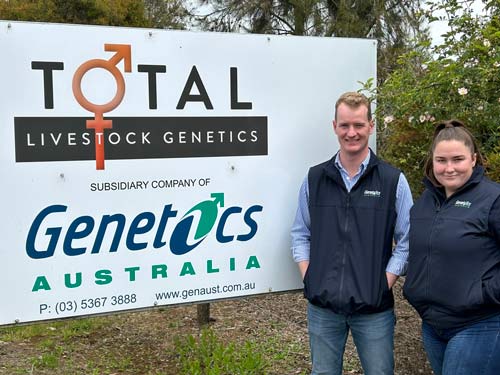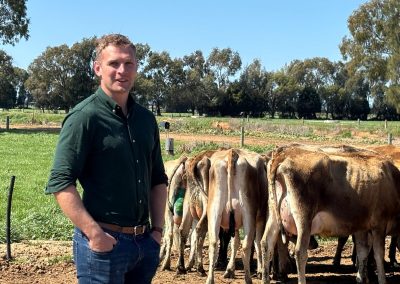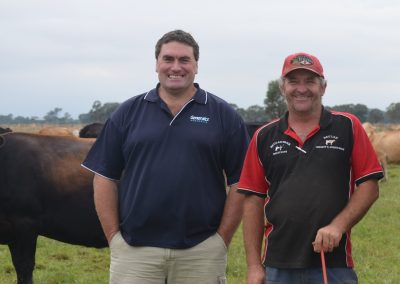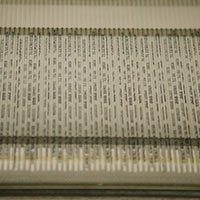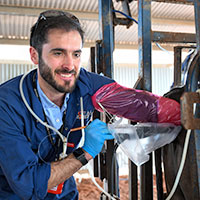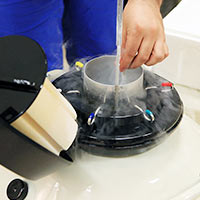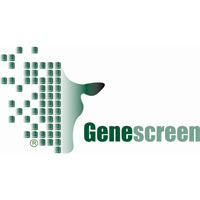Damien Thomson admits he’s a bit obsessed when it comes to beef cattle genetics, so his new job as Genetics Australia’s beef manager is like a dream come true. Damien grew up around beef with his family cattle operation Shacorrahdalu Angus at Yass, NSW (the title created from abbreviations of the names of the family’s five children). A career combining agriculture, economics and business was always on the cards and Damien’s love of genetics makes this job a perfect choice.
“It goes beyond a passion for me; I’d call it an obsession,” Damien said. “I’d describe myself as obsessed with genetic improvement. Being able to find and source top bulls and market them to clients to enhance their genetic improvement is very much a dream job.”
This isn’t a new obsession, although Damien admits his fiancé Caitlin says he currently spends far too much time looking at bulls.
“From an early age, I remember being introduced to the idea of EBVs and how you could take a cow with a high birth weight and cross it with a bull with a low birth weight and get the average of the two,” he said. “I’m not sure what it was, but I latched on to it from a young age.”
Damien’s appointment is part of Genetics Australia’s push to grow its beef operation. His role will involve developing and expanding the beef genetics business, marketing the current bull catalogue, developing relationships with clients, sales, and procuring new sires and working with the team in determining the direction for beef genetics. “We’re looking at how the business wants to be positioned in the beef genetics space,” he said.
Damien’s parents Peter and Liz bought their first farm in 1998 running commercial Angus. They purchased their first seven stud cows in 2009, building up the herd to calve about 200 stud cows this year. Much of that growth was achieved through embryo transfer. “We also run a 350-head commercial herd and put a lot of embryos from the stud herd into them to increase numbers and promote genetic gain.”
Damien, 26, grew up in Canberra but went to the farm on weekends since he was one-year-old.
“I love working on the land and with cattle, and making consistent progress in something you own and build up. Industry wide, the people are the main thing for me. The networks and relationships you build up are wonderful. It’s a really enjoyable industry to be part of.”
Damien has been heavily involved in the breeding program at Shacorrahdalu. “We have a breeding program focused on objective genetic improvement for commercial beef production while also balancing genotype and visual assessment of the cattle,” he said. “We use the tools of genomics and EBVs to make the best possible selection decisions.” They are rightly proud of their progress. The stud has been recognised in Bush Agribusiness’s Top Studs publication for its genetic progress.
“Angus Australia produces quarterly reports for genetic benchmarking and we’re constantly keeping track of our genetic progress and also comprehensively recording the performance of our own herd and tracking the actual performance of the animals,” Damien said. “Genomics is a very powerful tool for using the animal’s DNA to predict its performance and the performance of its progeny, but it doesn’t work if it doesn’t have the raw data behind it. We’re very committed to collecting that data in our herd and have been involved in the Angus Sire Benchmarking Program, entering bulls in recent years.”
Damien’s love of the industry and its people led to his involvement in the Angus youth program. He won the Stud Master title at his first Round Up in 2019, an award that focuses on young, promising breeders.
In January this year he travelled to New Zealand after winning a Trans-Tasman travel bursary.
“That was awesome,” Damien said. “I spent four weeks meeting and staying with breeders and getting to understand their programs and different environments and markets. What they target in their genetics was a real eye-opener. It was a pivotal point in my career in understanding the requirements and power of genetic improvement” “In Australia we are very feedlot and grain-fed focused, in New Zealand they only have one feedlot so they are very much a grass-fed production system which is their main selling point. They have very steep hills but very good pasture growing conditions so they like good structure, low mature weight and high fat for grass finishing.”
Damien says one of the best things about breeding Angus cattle is its diversity. “The tour gave me a better understanding of that and the different perspectives and why they need to target different traits,” he said. “I’m looking forward to doing something similar in Australia – getting around the country and understanding people’s programs.”
Prior to joining Genetics Australia, Damien worked for AuctionsPlus as a senior market analyst and before that was with ABARES as an industry economist, his first job after graduating from University of New England with a Bachelor of Agricultural and Resource Economics and Sciences. “I knew from a young age I was going to work in a mixture of agriculture, economics and business and I feel like I’m part of something bigger.”
Despite the challenges of tough seasons and current low prices, Damien sees a positive future for the beef industry. “It’s incredibly patchy seasonally and it looks like we’re in for a tough and long summer. Prices are quite low, adding to that tough situation, but I think the long-term trajectory of the beef industry is incredibly positive.
“We produce a world-class product that is in demand in international markets. We have a very sustainable and green image which gives us huge opportunities for the future.”
Damien and Shacorrahdalu Angus have had a long connection with GA, using a number of AI sires, including the current Tehama Testament.
